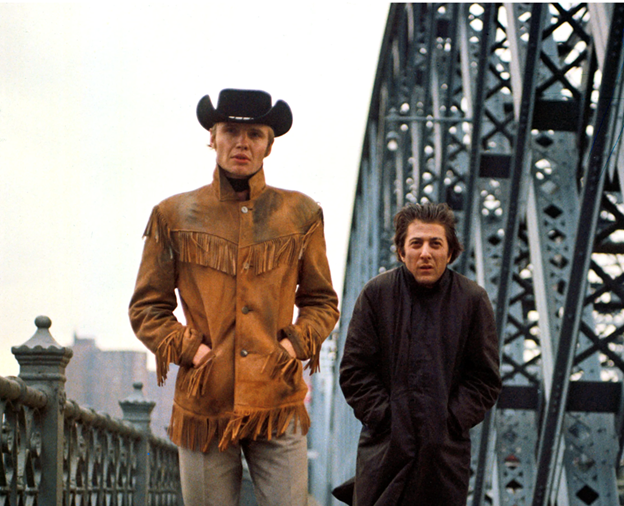
Jon Voight and Dustin Hoffman in Midnight Cowboy, as seen in Desperate Souls, Dark City and the Legend of Midnight Cowboy (Zeitgeist Films in association with Kino Lorber)
![]() John Schlesinger’s 1969 adaptation of James Leo Herlihy’s 1965 novel Midnight Cowboy, about a Texas hayseed who goes to New York City to become a high-class hustler, became the only X-rated film to win the best picture Oscar, and the saga of its making is examined in Nancy Buirski’s imaginative documentary. In fact, as the title makes clear, Buirski has more on her mind than a simple account of the production and legacy of this landmark film, even though there are enlightening interviews (old and new) with its actors and others, including critics Lucy Sante and Jim Hoberman.
John Schlesinger’s 1969 adaptation of James Leo Herlihy’s 1965 novel Midnight Cowboy, about a Texas hayseed who goes to New York City to become a high-class hustler, became the only X-rated film to win the best picture Oscar, and the saga of its making is examined in Nancy Buirski’s imaginative documentary. In fact, as the title makes clear, Buirski has more on her mind than a simple account of the production and legacy of this landmark film, even though there are enlightening interviews (old and new) with its actors and others, including critics Lucy Sante and Jim Hoberman.
Inspired by Scott Frankel’s equally expansive 2021 book, Shooting ‘Midnight Cowboy’: Art, Sex, Loneliness, Liberation, and the Making of a Dark Classic, Buirski looks at the film through the twin lenses of Schlesinger’s homosexuality and the explosive 1960s. Though Schlesinger was a successful director—he was nominated for a best director Oscar for his 1965 film Darling—his 1967 adaptation of the classic Thomas Hardy novel Far from the Madding Crowd was a box-office failure. It was imperative that his next project was a hit. Referring to Schlesinger’s personal and professional life, the director’s nephew Ian Buruma describes his uncle as “an observer more than a participant or activist.” Those powers of observation helped Schlesinger’s film assume classic status.
When Joe Buck (Jon Voight) arrives in a dingy, dirty New York, he starts bedding bored rich women for money, but he’s adrift in the big, unforgiving city, along with his newfound friend, Ratso Rizzo (Dustin Hoffman), a limping conman from the Bronx. Their close friendship—the sole glimpse of humanity in the movie—is the heart of Schlesinger’s often vividly unglamorous adaptation, and the iconic performances by Voight (then an unknown) and Hoffman (as far from his breakthrough role in The Graduate as possible) have since cemented these outcasts as indelible screen creations.
That both Schlesinger and novelist Herlihy were gay men at a time when it was impossible to live such lives openly is examined in the context of Joe and Ratso’s intimate and ambiguous bond. A scene alluding to fellatio contributed to the film’s original X rating, although it was given an R without one frame cut after it became an award winner. In 1969, the year of the Stonewall riots, homosexuality was still a criminal act and thought of as a psychological affliction. Yet, as Charles Kaiser—author of the groundbreaking social history The Gay Metropolis—states, this period was “the beginning of the unraveling of the faith in conventional wisdom and experts,” which paved the way for films like Midnight Cowboy and then some.
In addition, Buirski asserts that Midnight Cowboy got made because Hollywood was at a crossroads between the old studio system and a new, risk-taking hierarchy that was replacing it. It’s telling that on the same evening Midnight Cowboy won Oscars for best film, director, and adapted screenplay, John Wayne managed to win his only Academy Award for the resolutely old-fashioned True Grit. Voight humorously recounts a surreal encounter with Wayne at the awards ceremony, as old Hollywood literally bumps into the new kid on the block.
Buirski also paints a striking picture of the ’60s, not only in New York but across the country. There are eloquent archival images of the counterculture, Vietnam War, protests, and police brutality that is intercut with sequences from Midnight Cowboy and other films of that era, such as Haskell Wexler’s Medium Cool, a fiction/documentary hybrid about the brutal disorder at the 1968 Democratic Convention in Chicago. Buirski further underscores the connections between real events and pop culture with a contemporaneous soundtrack: Harry Nilsson’s “Everybody’s Talkin’,” which was Midnight Cowboy’s theme song, as well as the Guess Who’s “These Eyes” and Don McLean’s “American Pie” playing over the archival and movie footage.
Although Buirski adroitly weaves in audio from earlier interviews with Hoffman and Schlesinger (who died in 2003), her best talkers are Voight and Jennifer Salt, daughter of the film’s scriptwriter, Waldo Salt. She also had a small and significant role in Midnight Cowboy. Salt is honest and forthcoming about her father’s contribution to the film, as well as her respect for Schlesinger and her brief romantic relationship with Voight.
Voight is wonderfully frank in his memories of making the movie, with his description of Schlesinger’s crisis of confidence so marvelously told that Buirski begins her documentary with what turns out to be a priceless anecdote. He even becomes emotional thinking back to how important the film was to him, personally and professionally. To anyone has seen his recent appearances in right-wing media and dismissed him as a crank, Voight’s tender appreciations about Midnight Cowboy and John Schlesinger will come as a happy surprise.
















Leave A Comment